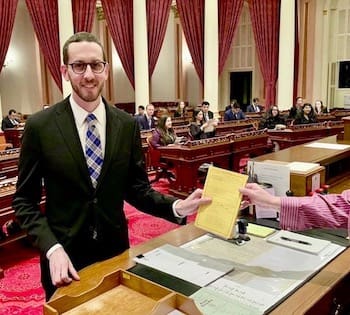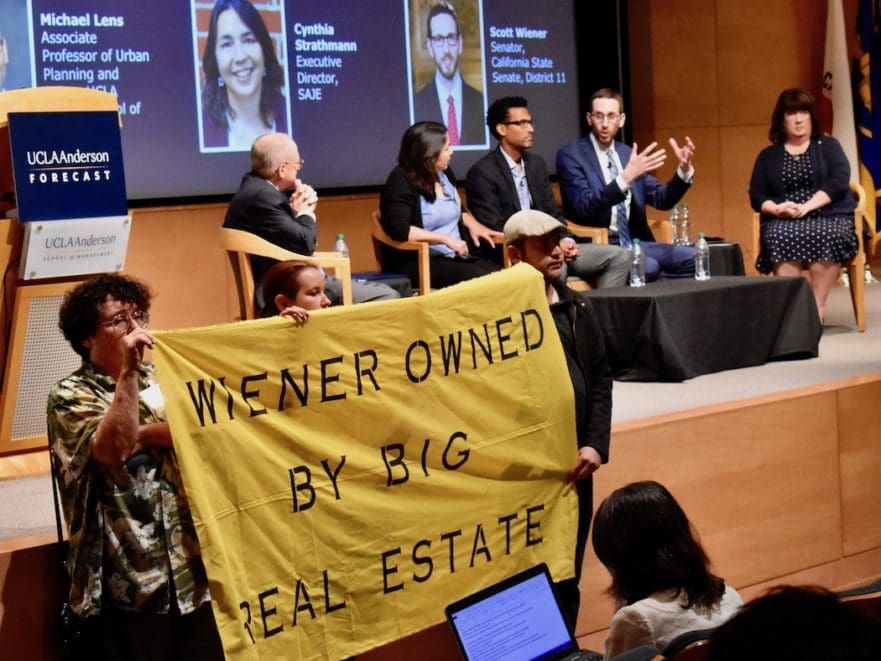A Housing Is A Human Right investigation has found that the real estate industry, including the California Apartment Association and notorious landlord Russell Flynn, have shelled out $153,816 to California State Senator Scott Wiener’s 2020 re-election campaign, according to state records. Wiener is the key sponsor of SB 50, the controversial housing bill that activists say will exacerbate gentrification crises in California cities.
While harming middle- and working-class communities, SB 50 will generate billions in revenue for the real estate industry. That includes luxury-housing developers, land-use lobbyists, real estate attorneys, real estate brokers, landlords, interior and landscape designers, property management firms, real estate lobbying groups, and architects. All of these people and groups have contributed campaign cash to Scott Wiener, Housing Is A Human Right found.
In addition, 12 of Wiener’s real estate contributors gave a total of $9.9 million to stop Proposition 10, the ballot measure that sought to repeal statewide restrictions on rent control. The initiative was defeated in November 2018.
More than 525 organizations and civic leaders endorsed Prop 10. Yet Wiener, a Democrat who represents San Francisco, refused to support the measure and go against his political patrons. During the election, The Nation deemed Prop 10 as one of the most important progressive battles in the country.
Since 2010, when he successfully ran for San Francisco supervisor, Wiener has relied on campaign contributions from developers, landlords, real estate attorneys, property management firms, and real estate lobbying groups to win elected office and remain in power. The state senator is now pushing SB 50, which housing justice activists describe as a “trickle-down housing” bill that will generate billions for luxury-housing developers and the real estate industry, but will worsen housing affordability and gentrification crises in California’s cities.
“SB 50’s so-called protections for gentrifying communities of color are insufficient and time-limited,” says Rene Moya, director of Housing Is A Human Right. “It’s premised on a failed mantra that building just about any housing, regardless of who it’s for and who owns it, will alleviate a crisis caused by financial speculation and requiring the displacement of poorer communities. It seems that Senator Wiener believes gentrification is inevitable; many of us in the housing rights movement strongly disagree. Housing policies should not create more damage.”

California State Sen. Scott Wiener
Wiener also opposed, last year, Proposition C, the San Francisco measure that sought to tax the city’s biggest businesses to fund homeless services. Executives at Twitter, Stripe, Zynga, and Lyft were against Prop C. Wiener received campaign contributions from employees of those tech companies, including $8,800 from Stripe co-founders Patrick and John Collison, according to state records reviewed by Housing Is A Human Right. But San Francisco voters overwhelming approved Prop C with 60 percent of the vote.
For his 2020 re-election campaign, Wiener received campaign cash from key Prop 10 opponents: the Apartment Association of Greater Los Angeles; California Building Industry Association PAC; landlord Russell Flynn; San Francisco Apartment Association PAC; California Apartment Association PAC, which sponsored the main No on Prop 10 committee; and California Real Estate Political Action Committee – California Association of Realtors, which contributed $8 million to No on Prop 10 committees.
Flynn, a regular contributor to Wiener, has built up his real estate empire in the Bay Area by forcing longtime tenants out of their rent-controlled units so he can jack up the rent with new tenants.
These and other real estate contributors, many of whom have long fought against rent control and other tenant rights policies, gave $45,050 to Wiener and $9.9 million to No on Prop 10 committees. With such political backers, the state senator did not endorse Prop 10. (See the PDF: Scott Wiener 2020 Re-Election Real Estate Campaign Contributions.)
In addition, Wiener received $2,500 from the Pharmaceutical Research and Manufacturers Association of America (PhRMA) PAC, which also contributed $500,000 to No on Prop 10. While drug prices have skyrocketed in the U.S., PhRMA routinely opposes pricing policies that protect consumers.
In contrast, more than 525 prominent social and housing justice organizations, civic leaders, and labor unions supported Prop 10, including the California Democratic Party, ACLU, the California Labor Federation, the California Teachers Association, SEIU, Our Revolution, labor and civil rights icon Dolores Huerta, U.S. Sen. Bernie Sanders, and many others.
Once again, Wiener was not aligned with his constituents. Although Prop 10 lost statewide, 53 precent of San Francisco voters supported the measure. Prop 10 also won a majority of support in Los Angeles, Oakland, Berkeley, Pasadena, Inglewood, Glendale, and numerous other cities struggling through California’s housing affordability and homeless crises.
In total, Wiener’s 2020 re-election campaign has so far received $153,816 from real estate lobbying groups, developers, real estate attorneys, real estate brokers, architects, property management employees, land-use lobbyists, interior and landscape designers, and landlords, among others. They include Build, Inc.; Reuben, Junius and Rose LLP; Spieker Realty Investments; Signature Homes, Inc.; California Apartment Association; and SummerHill Homes. (See the PDF: Scott Wiener 2020 Re-Election Real Estate Campaign Contributions.)
The California Apartment Association supports Wiener’s SB 50.
“We remain skeptical of Senator Weiner’s intent with SB 50,” says Moya of Housing Is A Human Right, “especially since he’s taken more than $150,000 in campaign contributions from major real estate interests and Prop 10 opponents. Money talks.”
(This article was updated on March 3, 2019.)

